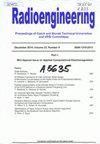基于联合传感器选择和半定规划的不合作辐射源定位
IF 0.7
4区 工程技术
Q4 ENGINEERING, ELECTRICAL & ELECTRONIC
引用次数: 0
摘要
基于接收信号强度(RSS)的无线电发射器定位由于其低硬件和计算成本,在大规模物联网(IoT)和无线传感器网络(WSN)中很有前途。为了提高其定位精度并降低系统能耗,我们提出了一种基于联合传感器选择和半定规划(SDP)的改进RSS定位算法。首先使用在传感器的随机集合处可用的RSSs来获得初始位置估计。然后通过分析传感网络的几何结构,选择一个精细的传感器集来完成第二次估计。根据定位精度和执行时间对该方法的性能进行了评估,并与现有方法进行了比较。大量仿真表明,所提出的方法在8到10个传感器的情况下实现了大约1.5米的定位精度。该方法在位置和发射功率估计精度方面都优于二阶锥规划(SOCP)和基于最小二乘相对误差(LSRE)的SDP算法。本文章由计算机程序翻译,如有差异,请以英文原文为准。
Uncooperative Emitter Localization Based on Joint Sensor Selection and Semidefinite Programming
. Radio emitter localization based on Received Signal Strength (RSS) is promising in large-scale Internet of Things (IoT) and wireless sensor networks (WSNs) for its low hardware and computation costs. To improve its localization accuracy and reduce the system energy consumption, we propose an improved RSS localization algorithm based on the joint sensor selection and semidefinite programming (SDP). An initial position estimate is first obtained using RSSs available at a random set of sensors. A refined sensor set is then selected to complete the second estimation by analyzing the geometric structure of sensing network. Performance of the method is evaluated in terms of localization accuracy and execution time, and compared with existing methods. Extensive simulations demonstrate that the proposed approach achieves a localization accuracy of approximately 1.5 m with 8 to 10 sensors. The method outperforms the second-order cone programming (SOCP) and the least squared relative error (LSRE)-based SDP algorithms in terms of both the location and the transmit power estimation accuracy.
求助全文
通过发布文献求助,成功后即可免费获取论文全文。
去求助
来源期刊

Radioengineering
工程技术-工程:电子与电气
CiteScore
2.00
自引率
9.10%
发文量
0
审稿时长
5.7 months
期刊介绍:
Since 1992, the Radioengineering Journal has been publishing original scientific and engineering papers from the area of wireless communication and application of wireless technologies. The submitted papers are expected to deal with electromagnetics (antennas, propagation, microwaves), signals, circuits, optics and related fields.
Each issue of the Radioengineering Journal is started by a feature article. Feature articles are organized by members of the Editorial Board to present the latest development in the selected areas of radio engineering.
The Radioengineering Journal makes a maximum effort to publish submitted papers as quickly as possible. The first round of reviews should be completed within two months. Then, authors are expected to improve their manuscript within one month. If substantial changes are recommended and further reviews are requested by the reviewers, the publication time is prolonged.
 求助内容:
求助内容: 应助结果提醒方式:
应助结果提醒方式:


